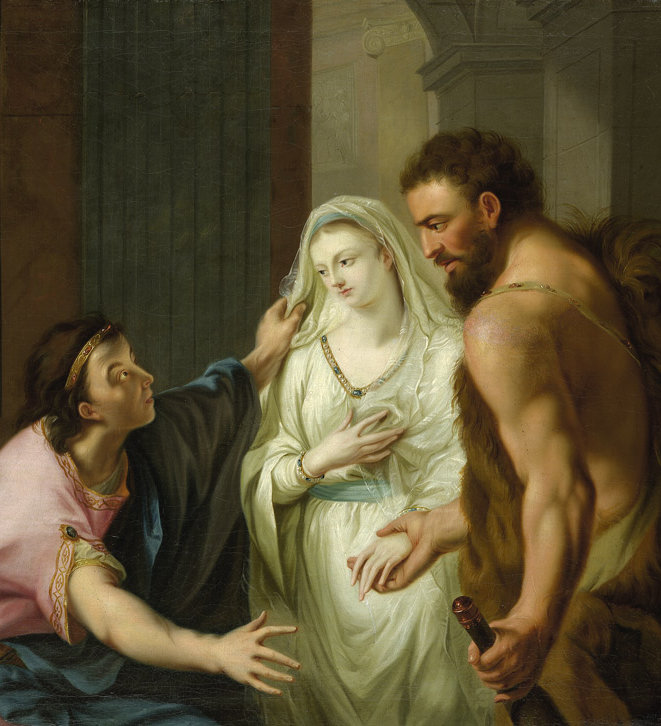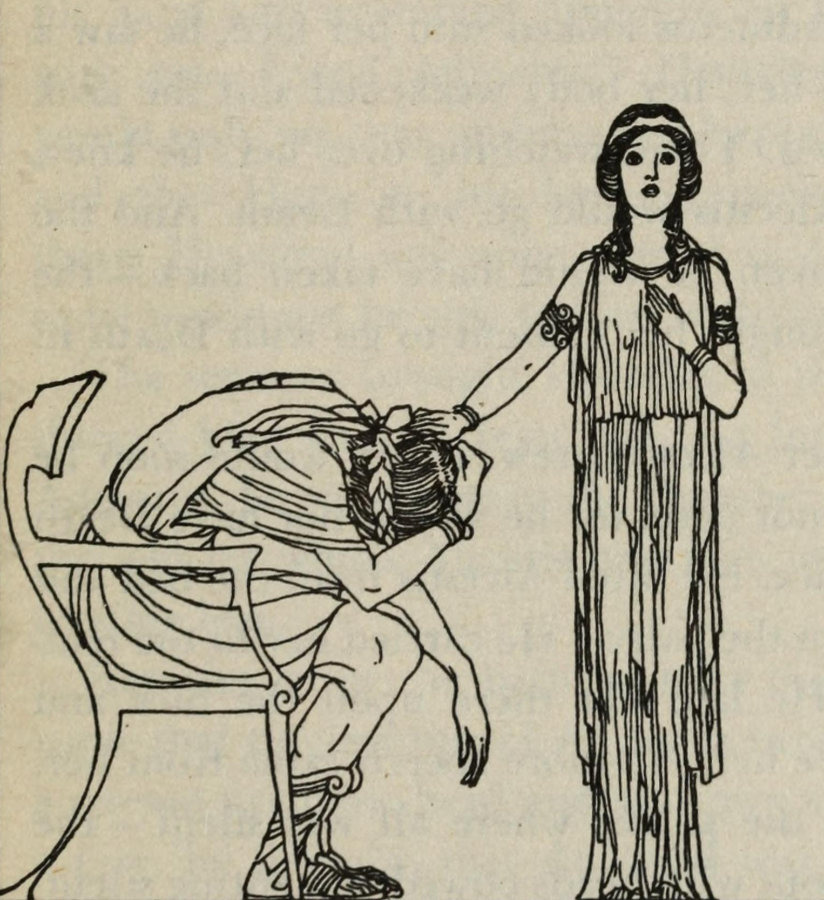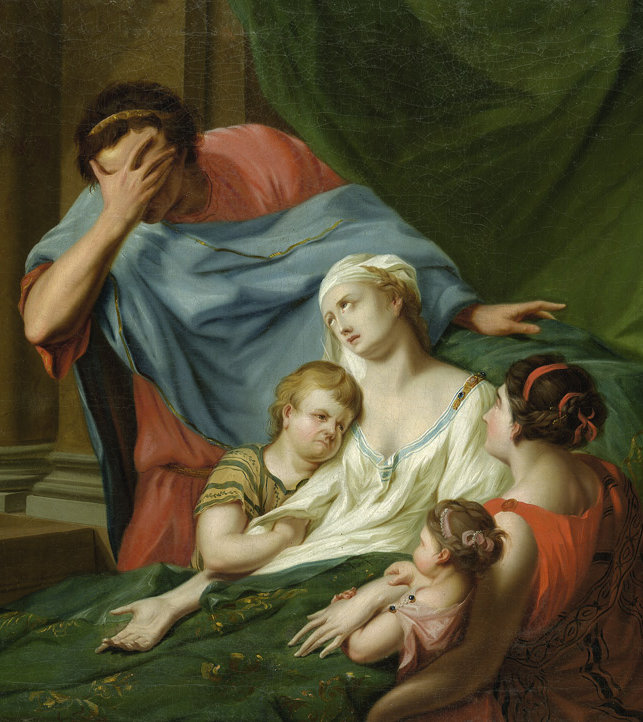In Greek mythology, Admetus was a king of Pherae in Thessaly. He was one of the Argonauts and took part in the Calydonian Boar hunt. Admetus’ wife Alcestis offered to substitute her own death for his. The most famous of Admetus’s children was Eumelus, who led a contingent from Pherae to fight in the Trojan War. He also had a daughter Perimele. Admetus was famed for his hospitality and justice. When Apollo was sentenced to a year of servitude to a mortal as punishment for killing Delphyne, or as later tradition has it, the Cyclopes, the god was sent to Admetus’ home to serve as his herdsman. Apollo in recompense for Admetus’ treatment made all the cows bear twins while he served as his cowherd. The romantic nature of their relationship was first described by Callimachus of Alexandria, who wrote that Apollo was “fired with love” for Admetus. Plutarch lists Admetus as one of Apollo’s lovers and says that Apollo served Admetus because he doted upon him. Latin poet Ovid in his Ars Amatoria said that even though he was a god, Apollo forsook his pride and stayed in as a servant for the sake of Admetus. Tibullus describes Apollo’s love to the king as servitium amoris (slavery of love) and asserts that Apollo became his servant not by force but by choice. The greatest aid Apollo gave to Admetus was persuading the Fates to reprieve Admetus of his fated day of death. According to Aeschylus, Apollo made the Fates drunk, and the Fates agreed to reprieve Admetus if he could find someone to die in his place. Admetus initially believed that one of his aged parents such as his father Pheres would happily take their son’s place of death. When they were unwilling, Alcestis instead died for Admetus. The situation was saved by Heracles, who rested at Pherae on his way towards the man-eating Mares of Diomedes. Heracles was greatly impressed by Admetus’s kind treatment of him as a guest, and when told of Admetus’ situation, he entered Alcestis’ tomb. He repaid the honor Admetus had done to him by wrestling with Thanatos until the god agreed to release Alcestis, then led her back into the mortal world… Plutarch said Heracles saved Alcestis via medicine, and that Heracles saved her because he and Admetus were lovers: “as [Admetus] had a great love for his wife, so was greatly beloved by the hero.” Plutarch said Heracles had too many male lovers to count, but listed Admetus and Iolaus as two of the most notable.
| Alias Admetus |
| Real Names/Alt Names Admetus |
| Characteristics Sailor, Argonauts, Bronze Age, Greek |
| Creators/Key Contributors Apollonius Rhodius |
| First Appearance Greek mythology |
| First Publisher ○ |
| Appearance List Literature: Homer’s Odyssey (mentioned, c. 8th century BCE, English 1614), Homer’s Iliad (mentioned, c. 8th century BC), Hesiod’s Theogony (c. 700 BCE), Medea by Euripides (431 BC), poetry by Appolonius, Diodorus, Valerius, Apollodorus, Ptolemy, Pausanias, Hyginus, Tzetzes, Apollonius of Rhodes’ epic poem Argonautica (late 3rd century BC), The Argonautica by Gaius Valerius Flaccus (late 1st century AD), Argonautica Orphica, Dante’s Divine Comedy (briefly, 1308–1320), William Morris’ epic poem The Life and Death of Jason (1867). Film: Jason and the Argonauts (1963). |
| Sample Read The Argonautica [PG] |
| Description In Greek mythology, Admetus was a king of Pherae in Thessaly. He was one of the Argonauts and took part in the Calydonian Boar hunt. Admetus’ wife Alcestis offered to substitute her own death for his. The most famous of Admetus’s children was Eumelus, who led a contingent from Pherae to fight in the Trojan War. He also had a daughter Perimele. Admetus was famed for his hospitality and justice. When Apollo was sentenced to a year of servitude to a mortal as punishment for killing Delphyne, or as later tradition has it, the Cyclopes, the god was sent to Admetus’ home to serve as his herdsman. Apollo in recompense for Admetus’ treatment made all the cows bear twins while he served as his cowherd. The romantic nature of their relationship was first described by Callimachus of Alexandria, who wrote that Apollo was “fired with love” for Admetus. Plutarch lists Admetus as one of Apollo’s lovers and says that Apollo served Admetus because he doted upon him. Latin poet Ovid in his Ars Amatoria said that even though he was a god, Apollo forsook his pride and stayed in as a servant for the sake of Admetus. Tibullus describes Apollo’s love to the king as servitium amoris (slavery of love) and asserts that Apollo became his servant not by force but by choice. The greatest aid Apollo gave to Admetus was persuading the Fates to reprieve Admetus of his fated day of death. According to Aeschylus, Apollo made the Fates drunk, and the Fates agreed to reprieve Admetus if he could find someone to die in his place. Admetus initially believed that one of his aged parents such as his father Pheres would happily take their son’s place of death. When they were unwilling, Alcestis instead died for Admetus. The situation was saved by Heracles, who rested at Pherae on his way towards the man-eating Mares of Diomedes. Heracles was greatly impressed by Admetus’s kind treatment of him as a guest, and when told of Admetus’ situation, he entered Alcestis’ tomb. He repaid the honor Admetus had done to him by wrestling with Thanatos until the god agreed to release Alcestis, then led her back into the mortal world… Plutarch said Heracles saved Alcestis via medicine, and that Heracles saved her because he and Admetus were lovers: “as [Admetus] had a great love for his wife, so was greatly beloved by the hero.” Plutarch said Heracles had too many male lovers to count, but listed Admetus and Iolaus as two of the most notable. |
| Source Admetus – Wikipedia |



